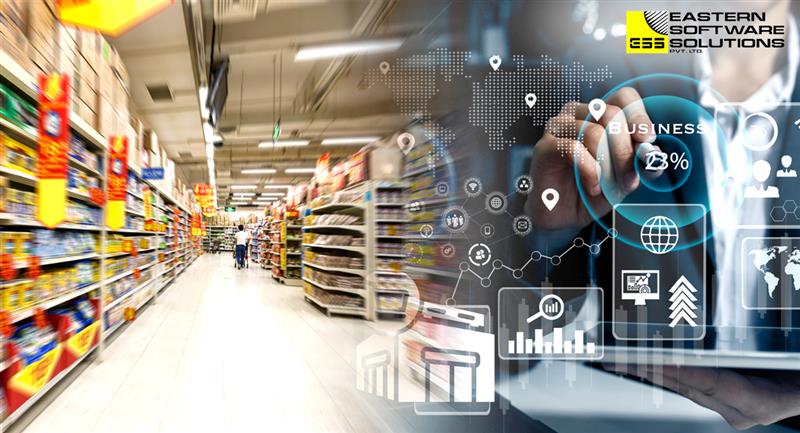Streamlining Supply Chains: Transforming Warehousing And Transport With RPA

In today's fast-paced world, getting products from manufacturers to consumers involves a complex journey known as the supply chain. This journey includes storing goods in warehouses and transporting them to various destinations. Traditionally, these processes have relied heavily on manual labor, which can lead to errors, delays, and higher costs. However, a technological advancement called RPA for Supply Chain is changing the game by automating repetitive tasks, making supply chains more efficient and reliable.
Understanding Robotic Process Automation
Imagine having a virtual assistant that can handle routine tasks quickly and accurately without getting tired. That's essentially what RPA does. It is designed to perform repetitive activities by mimicking human actions. In the context of supply chains, RPA solution can manage tasks like tracking inventory, processing orders, and scheduling shipments, all without human intervention.
Transforming Warehousing with RPA
Warehouses are critical hubs in the supply chain where products are stored before being shipped to their next destination. Managing a warehouse involves numerous repetitive tasks that can be time-consuming and prone to errors when done manually. Here's how RPA solution is making a difference:
1. Inventory Management: Keeping track of stock levels is vital to ensure products are available when needed. RPA can automatically monitor inventory, update records in real-time, and alert managers when it's time to restock, reducing the risk of overstocking or stockouts.
2. Order Processing: Order fulfillment speed and accuracy is very important in making customers satisfied with their expectations. RPA automates order processing, selection, and packaging, minimizing errors and accelerating order fulfillment. This guarantees timely deliveries, boosting customer satisfaction and loyalty.
3. Quality Assurance: Ensuring compliance with industry standards is crucial in warehouse operations. RPA plays a key role in quality assurance by monitoring whether manufacturing and supply chain processes align with regulatory requirements. It helps businesses adhere to compliance protocols, minimizing risks, and maintaining the overall quality of products before they reach the market.
4. Data Entry and Reporting: Warehouses generate a lot of data that needs to be recorded and analyzed. RPA can handle data entry tasks, compile reports, and provide insights into warehouse operations, helping managers make informed decisions without sifting through piles of paperwork.
Enhancing Transportation with RPA
Once products leave the warehouse, they need to be transported efficiently to their final destinations. RPA solution contributes in several ways:
1. Shipment Scheduling and Tracking: Coordinating deliveries can be complex, especially when dealing with multiple carriers and destinations. RPA can automate the scheduling of shipments, assign orders to the appropriate transport, and provide real-time tracking updates, ensuring timely deliveries and improved customer satisfaction.
2. Route Validation: Efficiency in deliveries depends on strategic route planning. RPA can assist by following predefined rules to validate and process route-related data, ensuring deliveries align with set schedules and business policies. It can automate tasks like verifying delivery windows, checking compliance with routing guidelines, and streamlining logistics workflows for improved operational efficiency.
3. Invoice and Billing: Timely and accurate invoicing is crucial for managing cash flow. RPA automates invoice creation and sending, ensuring they are correct and delivered on time. It can also match invoices with delivery records, helping to prevent disputes and payment delays.
4. Compliance and Documentation: Transporting goods requires regulatory compliance and handling a lot of paperwork. RPA helps by automatically creating and checking shipping documents, customs forms, and other necessary records. This reduces mistakes and prevents costly delays at border crossings.
5. Customer Communication: Keeping customers informed about their order status is crucial for a positive experience. RPA can automate notifications, sending timely updates about shipment status, estimated delivery times, and any delays, ensuring transparency and trust.
Benefits of Implementing RPA
RPA for supply chain offer several advantages:
• Cost Savings: By automating tasks that were previously performed manually, companies can reduce labor costs and minimize expenses associated with errors and delays.
• Increased Accuracy: RPA performs tasks consistently without the risk of human error, leading to more accurate inventory records, order processing, and shipment tracking.
• Scalability: As businesses grow, RPA can be scaled to handle increased workloads without the need for proportional increases in staff, making it easier to manage peak periods and expansion.
Next Step Towards Automation
RPA depicts a fundamental shift in supply chain operations. RPA for Supply Chain helps businesses in unlocking unmatched efficiencies, customer satisfaction, and cost savings. At ESS, we recognize the power of automation in effortlessly elevating your supply chain management to the next level. Let’s start a conversation about how we can assist your business on this automation journey.




